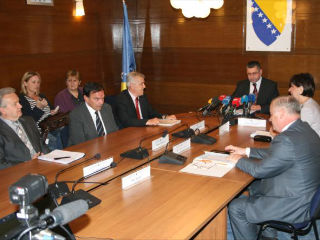
Political parties are already preparing their campaigns for the general and presidential elections in October, but analysts say they don’t expect the polls to deliver positive changes.
Parties start putting forward their candidates on Wednesday for the October 12 polls, at which voters will cast ballots for the tripartite presidency of Bosnia and Herzegovina, the House of Representatives of the state-level parliament and the parliament of the Federation entity, the National Assembly of Republika Srpska and its president and vice-president, as well as assemblies of the ten cantons within the Federation entity.
Amid the usual complexities of the country’s labyrinthine political system, Sarajevo-based political analyst Almir Terzic told Balkan Insight on that he expects politics as usual during the pre-election campaigns because most of the main parties are pushing the same policies.
“We can openly say that the focus of the election campaigns… will be on ethnic-national concepts and on spreading fear and hatred in order to win the elections again,” Terzic said.
“We cannot expect that there will be any kind of positive changes in the transparency of the elections due to the complicated electoral system,” he added.
Terzic also said that “discriminatory elements” remained in the electoral system, referring to a 2009 European Court of Human Rights ruling regarding the electoral rights of minorities.
The ruling told Bosnia to change its constitution and laws and allow minorities run for the top governing posts currently reserved only for candidates of the three largest ethnic groups, the Bosniaks, Serbs and Croats – but it has yet to be implemented.
Many parties are expected to use the recent devastating floods as a significant element of their campaigns.
“The floods will be one of the assets the parties will try to show the citizens as an example of their efforts to help them. Many already showed up in the role of saviours,” Terzic said.
People in Sarajevo also said that they did not expect significant changes at the upcoming elections.
“The elections will bring new parties but not something new in addition to that, because I simply do not see a person or a party that is significantly different from the others and has the energy and fairness to make changes,” said 34-year-old Adnan.
Twenty-five-year-old Dajana said that during the floods in the country, people were shaken by the devastation, and so the even tougher economic situation will probably ensure they will back the same political forces as they did the last time.
“Some will also probably decide not to go to vote too,” she said.
Halid, 52, agreed that the situation will more or less stay the same.
“The same parties will win; we’ve had the same singers for two decades and there’s no new orchestra either,” he said.
Adis Arapovic of the Centre for Civil Initiatives told Balkan Insight that a few new political parties or candidates had appeared on the scene before the elections, but that does not necessarily offer a chance for significant changes.
“This is a destructive pluralism,” he said, referring to votes ‘wasted’ on minor parties who don’t pass the necessary threshold to gain representation.
Arapovic also said that the results of the elections will strongly depend on how large the turnout is.
“If the turnout is higher than 50 per cent, let’s say if it was 60 per cent, than there could be some new factors taking a share of power, but if it is less than 50 per cent, then the same parties will stay,” he said.
The Central Election Commission told Balkan Insight that the elections will cost an estimated 4.6 million euro.
A total of 65 parties, 24 independent candidates and 24 coalitions have been confirmed as eligible to run./balkaninsight/